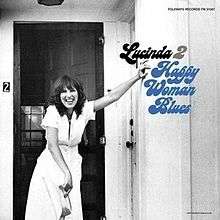Happy Woman Blues
Happy Woman Blues is the second studio album by Lucinda Williams. It was released in 1980. While her debut album consisted entirely of cover recordings, all of Happy Woman Blues was written by Williams herself.[1]
| Happy Woman Blues | ||||
|---|---|---|---|---|
 | ||||
| Studio album by | ||||
| Released | 1980 | |||
| Recorded | April–June 1980 | |||
| Studio | Sugar Hill Studios, Houston, Texas | |||
| Genre | Blues, folk, country, rock | |||
| Length | 35:13 | |||
| Label | Smithsonian Folkways | |||
| Producer | Mickey White, Lucinda Williams | |||
| Lucinda Williams chronology | ||||
| ||||
Critical reception
In a contemporary review for The Village Voice, Robert Christgau gave Happy Woman Blues an "A–" and called Williams a "guileless throwback to the days of the acoustic blues mamas" who "means what she says and says what she means".[1] In a retrospective review, AllMusic's Kurt Wolff gave it four out of five stars and said "King of Hearts", "Sharp Cutting Wings", and "Lafayette" are well composed, emotionally powerful "classics" on an album that was bold, refreshing, and "stunning for its mixture of blues, folk, and country traditions with [Williams'] captivating, complex, and visceral approach to writing and singing".[2] Trouser Press felt the record was more "rock-oriented" than Williams' debut album, writing that she used timeworn ideas such as "smoke-stained bars, open roads and a heart that never learns" but reimagined them "in a way that is both contemporary and uncynical".[3]
Track listing
All songs by Lucinda Williams
- "Lafayette" – 3:40
- "I Lost It" – 2:52
- "Maria" – 3:45
- "Happy Woman Blues" – 3:08
- "King of Hearts" – 4:02
- "Rolling Along" – 2:46
- "One Night Stand" – 2:53
- "Howlin' at Midnight" – 3:49
- "Hard Road" – 2:29
- "Louisiana Man" – 2:23
- "Sharp Cutting Wings (Song to a Poet)" – 3:26
Personnel
- Lucinda Williams – lead vocals, acoustic guitars
- Mickey White – acoustic rhythm and lead guitars, harmony vocals
- Rex Bell – electric bass, harmony vocals
- Andre Mathews – electric rhythm, lead and slide guitars
- Ira Wilkes – drums
- Mickey Moody – pedal steel guitar
- Malcolm Smith – fiddle, viola
References
- Christgau, Robert (October 5, 1981). "Consumer Guide". The Village Voice. New York. Retrieved September 3, 2015.
- Wolff, Kurt. "Happy Woman Blues". AllMusic. Retrieved September 3, 2015.
- "Lucinda Williams". Trouser Press. Retrieved September 3, 2015.